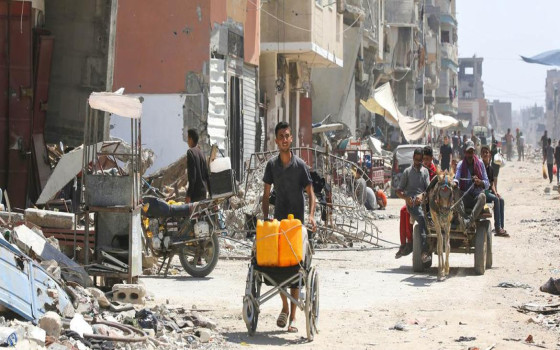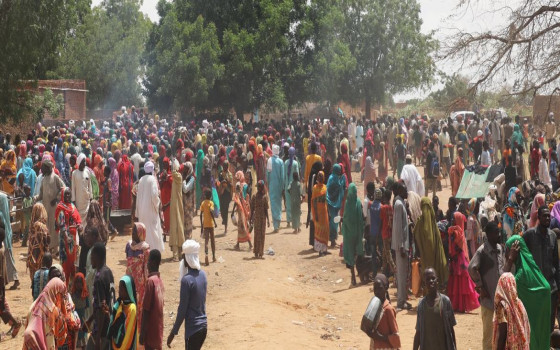Stopping conflicts instead of spending on aid.. Record funding pledges to support refugees and displaced persons in 2025 amid escalating conflicts

- Europe and Arabs
- Wednesday , 4 December 2024 9:43 AM GMT
New York - Brussels: Europe and the Arabs
A significant increase in international pledges to provide urgent and life-saving aid during the coming year to those affected in conflict areas. Everyone knows that the crises at the present time are concentrated in the Middle East region, especially in the Palestinian territories and Lebanon, as well as in Sudan and Yemen, in addition to Ukraine and others, but isn’t it more useful to work to stop the conflicts and provide those financial pledges allocated for aid and transform them into a source for achieving development in poor countries?
In a report reported by the United Nations Daily News, the United Nations High Commissioner for Refugees said that donor governments pledged a record amount of 1.143 billion US dollars to provide protection, life-saving assistance and solutions during 2025 for millions of people displaced by the increasing number of conflicts around the world. In a statement issued by the UNHCR after the UNHCR pledging conference held yesterday, Tuesday, it explained that, along with a commitment of $355 million from the UNHCR’s national private sector partners, the total amount announced amounts to $1.5 billion, covering 15 percent of the expected needs for that year.
The UNHCR confirmed that these resources will allow it to start the year with greater confidence and continue its work, which is a lifeline for many forcibly displaced people, providing emergency assistance, providing protection and humanitarian assistance, and seeking long-term solutions.
It reported that the United States led the pledges with $200 million, followed by Denmark and Sweden, with significant increases announced by the Netherlands and Germany, adding that several countries have shown new or enhanced early support this year, including Armenia, Bulgaria and Lithuania. UNHCR’s global appeal calls on donors to provide US$10.248 billion in funding for 2025 to support forcibly displaced and stateless people, most of whom live close to their countries of origin.
Governments attending the conference pledged some US$283 million in funding for 2026 and beyond. UNHCR stressed that this is critical for planning and stabilizing UNHCR’s long-term programmes aimed at promoting durable solutions.
Better funding, bolder solutions
“We live in a world ravaged by brutal and endless conflicts that tear lives apart and send people on a desperate journey in search of safety,” said Filippo Grandi, UN High Commissioner for Refugees.
He added that today’s strong support for refugees and other forcibly displaced people resonates as a much-needed message of solidarity and humanity, and that the pledges made are a commitment to saving lives, restoring dignity and bringing hope to millions of people forced to flee.
With forced displacement at unprecedented levels, with an estimated 123 million people forcibly displaced worldwide, securing these funds will be crucial to responding to new conflicts and protracted crises.
Grande noted that while humanitarian funding is generous, it is not keeping pace with growing needs.
“With peace increasingly elusive, and conflict and persecution continuing to force millions from their homes, we face a dire situation, with few solutions and mounting crises. Humanitarian assistance must focus on reducing dependency, and helping displaced communities thrive, not just survive. To do that, we need more and better funding, but also bold solutions,” he said.
UNHCR said that thanks to funding received in 2024, by mid-year, more than three million people had been individually registered, 1.2 million people had been supported with their civil identity or legal status, and more than 500,000 had received legal assistance. Across UNHCR operations, more than 2 million people received life-saving cash assistance, more than 9.5 million individual consultations were conducted in UNHCR-supported health care centres, 5.6 million people were supported with access to water and sanitation services, and 630,000 people received shelter and housing assistance.














No Comments Found